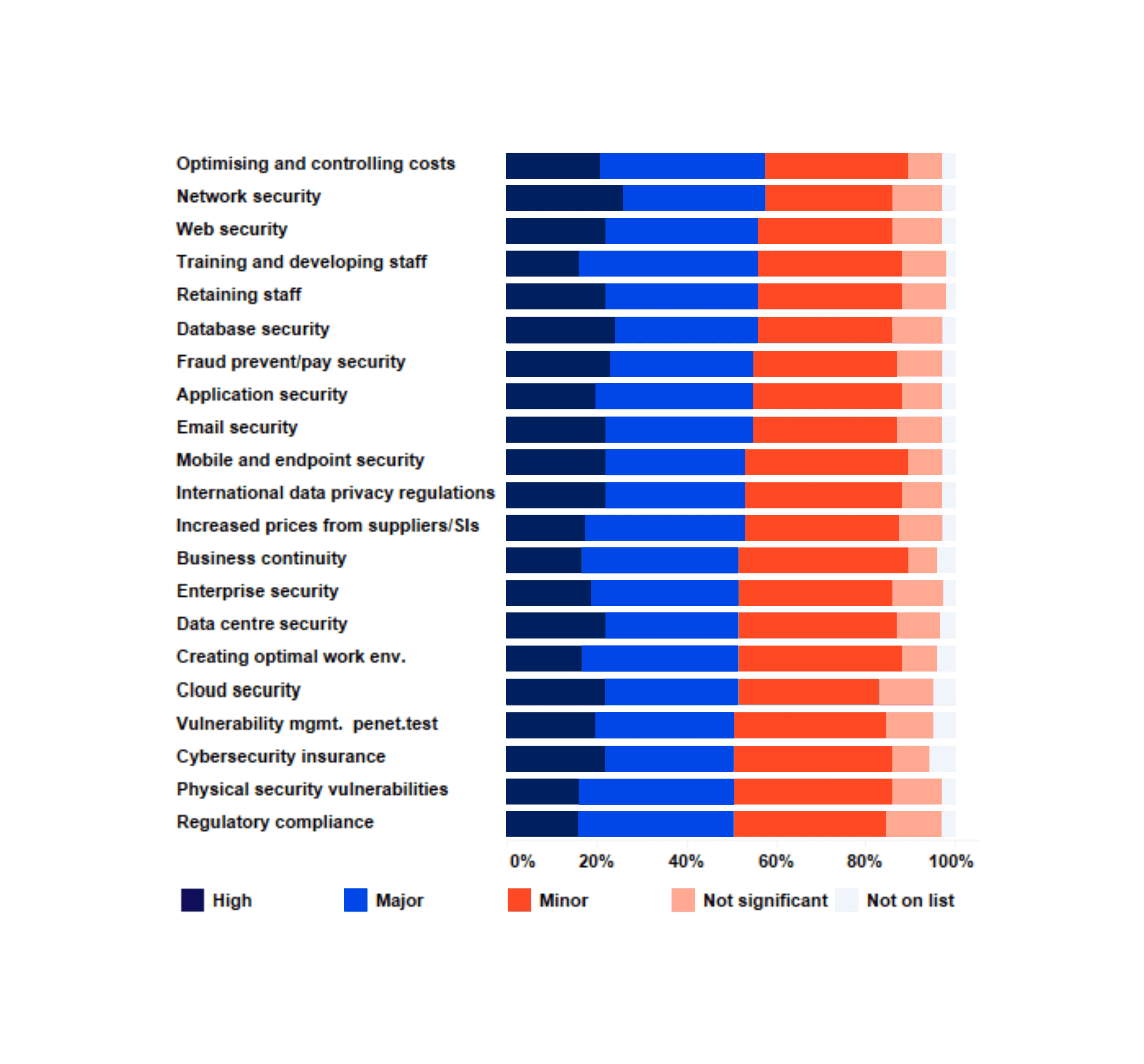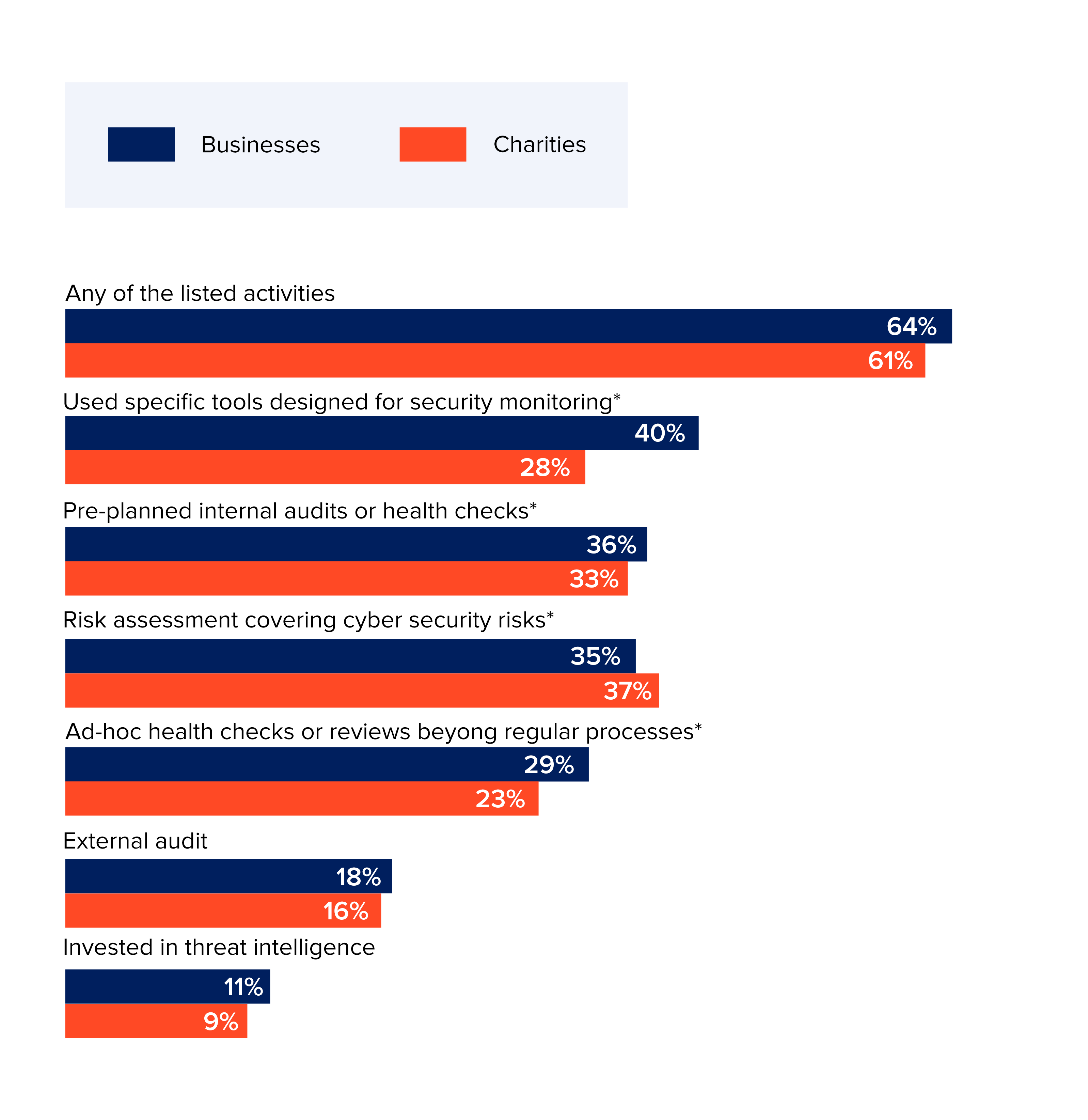
The pandemic has affected every sphere of our lives, and in-store retail, among other industries, has felt a profound impact. Meanwhile, eCommerce has seen an unprecedented uptick as a result of customers preferring to shop remotely and safely from their homes. According to a survey conducted by Shopify, since the pandemic started, 84% of consumers have shopped online, compared to 65% who have shopped offline.
COVID-19 has pushed our lives further online and has either prevented or discouraged offline shopping. However, as lockdown measures are gradually lifting, consumers are getting back to in-store shopping. And as the chart below shows, retail security in all aspects remains one of the biggest challenges in the sector.
Install in-store security systems
While points of sale are mostly open, some lockdown restrictions still require the closure of many premises. This means that both open and temporarily closed physical stores are vulnerable to theft and damage. And while social distancing measures require a minimum distance between people, security technologies are in higher demand than ever.
In-store security can be improved by an organisational and technical method of counteracting criminals. Security policy and employee security training can help to prevent many threats related to employee behaviour, social engineering, etc.
Possible in-store security measures include:
- Alarm systems (motion sensors, open/close sensors, glass-break detection, gas and fire analysers, etc.)
- Video surveillance systems
- Access control systems with RFID chips
The list can be extended, but let's focus on the most popular measure – RFID chips. Installing RFID chips in your merchandise is one of the best ways to prevent shoplifting in your physical stores. In case an item is illegally removed from a store, the sensor sends a notification to the security team.
The in-store video surveillance system is another method to protect your bottom line. The retail industry has already been leveraging CCTV systems, also known as video surveillance, to protect brick-and-mortar stores from shoplifting. According to Statista, the global video surveillance market has reached $45.5 billion in 2020 and is estimated to grow further to $74.6 billion in 2025. The shift towards cloud-based CCTV systems provides real-time video alerts, allowing the security team to be proactive and prevent loss. Moreover, systems enhanced with AI can identify different items to minimise potential false alarms.
Consumers are not the only cause of the inventory shrink; some employees are also tempted to take items illegally. And loss prevention methods such as the installation of a surveillance system are especially useful in minimising the possibility of internal theft.

Use security solutions to mitigate health and safety risks
A retail surveillance security system can help to control the number of customers allowed in the building, which is a number one priority during COVID-19 restrictions. CCTV cameras and sensors can also come in handy for tracking customers’ temperatures. Security officers with handheld temperature checking devices are the new normal. However, security cameras powered by infrared technology automatically track body temperature, allowing security guards to focus on other priorities.
Contactless payment is another technology solution that helps prevent the spread of the virus, and it saw a significant uptick in 2020. With the implementation of technology comes responsibility. Encrypting credit card swipers will prevent hackers from accessing customers’ credit card data and reduce the amount of credit card fraud.
Once you put your security system online for remote access, support, and maintenance, or connect it to the local network, which in turn is connected to the internet, make sure it is secure. Here are some ideas on how to ensure network security:
- Virtual Private Network (VPN). A VPN allows a direct connection with your security system and is one of the most secure ways to access it.
- Peer-2-Peer (P2P) method. Use P2P to first transfer data through a third-party server before connecting to your system.
- Port forwarding. Use this process to direct traffic from the outside world to the appropriate server, resulting in a direct connection to your security system through your internet router.
Focus on eCommerce cybersecurity
The rising number of cybersecurity threats and the continuous growth of online shopping requires retail industry players to keep customers’ data secure. The level of security technology implementation in retail is lower compared to many other industries.
According to the Cyber Security Breaches Survey 2020, 40% of respondents in the retail and wholesale sector hadn’t undertaken any action (see the chart below) to identify cybersecurity risks in the previous 12 months.
Many retail business owners do not understand the risks to their business. It's not only about direct financial losses but also about reputational losses, which can sometimes exceed financial losses. Here are the top things you should consider to enhance your cybersecurity and keep your online store safe:
- Choose an eCommerce platform with extensive security measures.
- Install and use only the licensed software.
- Antivirus software should be used on all solutions.
- Implement a two-factor authentication process.
- Conduct security penetration testing and audits of your website.
- Educate users on phishing, ransomware and other threats.
- Develop and implement an action plan for use during information security incidents.
- Plan and audit your retail business according to information security standards.
Conclusion
In-store security systems and online commerce cybersecurity can guarantee the security of retail. However, many retail industry players do not fully take advantage of the solutions presented by the security industry. With offenders getting more advanced in their criminal activity, retailers must respond with security improvements. It is high time to modernise.

Related Insights








The breadth of knowledge and understanding that ELEKS has within its walls allows us to leverage that expertise to make superior deliverables for our customers. When you work with ELEKS, you are working with the top 1% of the aptitude and engineering excellence of the whole country.

Right from the start, we really liked ELEKS’ commitment and engagement. They came to us with their best people to try to understand our context, our business idea, and developed the first prototype with us. They were very professional and very customer oriented. I think, without ELEKS it probably would not have been possible to have such a successful product in such a short period of time.

ELEKS has been involved in the development of a number of our consumer-facing websites and mobile applications that allow our customers to easily track their shipments, get the information they need as well as stay in touch with us. We’ve appreciated the level of ELEKS’ expertise, responsiveness and attention to details.



